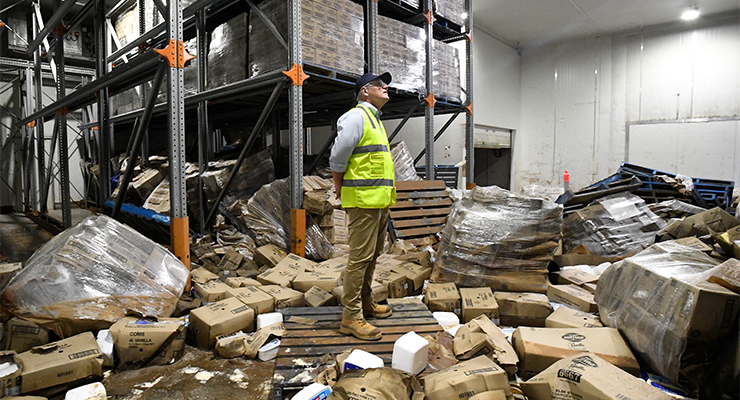
I know, lawyers are required to be serious. Mea culpa. The question had arisen in the course of Scott Morrison’s Dear Leader-style visit to flood-ravaged Lismore on Wednesday as to why he had left it until well after half of NSW had gone under and resurfaced before deciding to declare it a national emergency.
We helpfully explained:

I thought the sarcasm was unsubtle enough to be visible from space but, judging by the responses, no. We had created considerable consternation and a very modern problem: fake law. So we did the responsible thing, clarifying thus:

That seems to have done the trick.
Still, the serious question remains: why the late declaration? The correct answer is the obvious one: there was no reason to not declare a national emergency earlier, unless the prime minister was insisting on announcing it himself, standing on a pile of waterlogged furniture like George W Bush at Ground Zero. And Morrison, as it happened, was in COVID isolation until the day the emergency was declared. Coincidence? With this government, there is no such thing.
The actual law here is genuinely boring. After the 2019 bushfire/Hawaii disaster, the government rushed through a law, the National Emergency Declaration Act, the idea being to streamline such declarations and the attendant opening of the federal emergency relief tap (at least in theory).
Technically, national emergency declarations are made by the governor-general as part of the ongoing make-work scheme upholding his or her position as ostensible head of the executive government. It’s a bit pointless for laws like this one, which gives the G-G no genuine discretion but says it’s the prime minister who has to be satisfied it’s needed.
The grounds are “nationally significant harm”, real or likely. The trigger can be a request from a state or territory government, but (contrary to what a lot of federal government ministers have been saying this week) that isn’t necessary. The feds can also do it if they’re satisfied it is “appropriate, having regard to the nature of the emergency and the nature and severity of the nationally significant harm”.
That is a discretionary power designed to be wider than the Nullarbor. The only real check on it is the existence of harm, so the courts could invalidate a declaration if the government had simply made that up.
Would anyone ever challenge a national emergency declaration? It doesn’t authorise turning out the troops — they can do that on request by a state government under other laws (which are more problematic than this one).
Well, they might have cause to want to. The act doesn’t do a lot beyond the declaration, but it contains a dangerous sleeper. While a declaration is in force, the act gives all federal ministers extra special powers enabling them, by legislative instrument (meaning personal fiat), to vary the effect of Commonwealth laws in certain respects.
This can be useful. For example, a minister can relieve people of strict requirements to sign or witness documents or provide information to government agencies, things which can solve otherwise difficult logistical problems in an emergency.
But it is, potentially, extremely broad. The act would permit the minister responsible for the freedom of information law to neuter its effectiveness, or the minister responsible for welfare payments to actually make life harder for recipients by imposing more onerous burdens rather than less.
With any luck such things remain hypotheticals for nitpicky lawyers and nothing more. Like many of the laws on our federal statute books, luck is all we have to go on. A law which says that acts of Parliament can be varied by anyone other than Parliament is dangerous (and unnecessary).
Certainly no such problems will arise with this particular emergency declaration, the legislative equivalent of a photo opportunity. I should add, it doesn’t mean federal money will necessarily flow. That’s a different decision. On form, I wouldn’t be holding my breath.
Should the prime minister have declared the floods a national emergency earlier, before his photo op? Let us know your thoughts by writing to letters@crikey.com.au. Please include your full name to be considered for publication. We reserve the right to edit for length and clarity.








Morrison’s Government is a misnomer, simply because they don’t govern. Morrison is a pastiche of FU in a House of Cards, and Jim Hacker. I suspect that a Malcolm Tucker is also at work in his office.
So instead of going to war and getting all the powers that go with declarations of war participation, the government can just declare a national emergency and get autocracy? Choice. I running for PM. If fed government is just going to be a cash cow for those with the keys to the lodge, I want those keys. The national emergency will be that I’m in charge. Self fulfilling profit see.